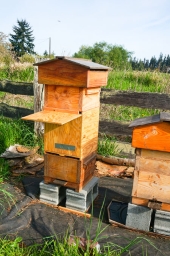
 4
4




-Nathanael
 3
3




Invasive plants are Earth's way of insisting we notice her medicines. Stephen Herrod Buhner
Everyone learns what works by learning what doesn't work. Stephen Herrod Buhner
 5
5




 6
6




-Nathanael
 7
7




Argue for your limitations and they are yours forever.
 7
7




Mike Barkley wrote:Does your artificial foundation have a beeswax coating? Adding a thin layer of wax &/or a couple drops of lemongrass or peppermint oil inside the hive might help keep them inside long enough to consider it home.
-Nathanael
 10
10




-Nathanael
 5
5




John Daley Bendigo, Australia The Enemy of progress is the hope of a perfect plan
Benefits of rainfall collection https://permies.com/t/88043/benefits-rainfall-collection
GOOD DEBT/ BAD DEBT https://permies.com/t/179218/mortgages-good-debt-bad-debt
 5
5




-Nathanael
 8
8




Argue for your limitations and they are yours forever.
 6
6




Mike Barkley wrote:Sounds like you didn't have much choice except to remove the burr comb from the lid if you ever wanted to access the inside again. Bees can work extremely fast filling empty spaces. It can become a tangled mess that only a bee can appreciate. Frames & foundation are for human needs not for the bees needs.
I suggest removing the old comb from the floor. Melt it down & use a paintbrush to add a thin layer to the artificial foundations. Then install all the frames back into the hive. Don't beat yourself up over forgetting. Consider it a lesson learned the hard way & move on. It seems there is plenty of bee activity near you so I think you'll have more soon.
About honey harvest ... since I don't know anything about your seasons or pollen availability throughout the year just remember that is the bee food supply. Harvest very sparingly & only after they are well established with a large honey supply.
Good luck. You got this!!!
-Nathanael
 5
5




John Daley Bendigo, Australia The Enemy of progress is the hope of a perfect plan
Benefits of rainfall collection https://permies.com/t/88043/benefits-rainfall-collection
GOOD DEBT/ BAD DEBT https://permies.com/t/179218/mortgages-good-debt-bad-debt
 7
7




Argue for your limitations and they are yours forever.
 2
2




Mike Barkley wrote:No. Install the frames with foundation. A swarm will still move in. If you capture a swarm somewhere else just place them on top of the frames with the cover removed. Add the cover once they get inside. Working with no foundations is more suited for experienced beekeepers.
-Nathanael
 10
10




-Nathanael
 5
5




Argue for your limitations and they are yours forever.
 7
7




 8
8




-Nathanael
 7
7




Argue for your limitations and they are yours forever.
 5
5




'What we do now echoes in eternity.' Marcus Aurelius
How Permies Works Dr. Redhawk's Epic Soil Series
 5
5




Joylynn Hardesty wrote:Is your weather turning into spring or fall?
-Nathanael








 7
7




'What we do now echoes in eternity.' Marcus Aurelius
How Permies Works Dr. Redhawk's Epic Soil Series
 6
6




Joylynn Hardesty wrote:Oh, good! No need for emergency feeding of sugar. Here, a newly started hive might starve over winter without help. Sugar isnt a good solution, but dead bees is a terrible outcome.
-Nathanael
 8
8




Argue for your limitations and they are yours forever.
 1
1




-Nathanael
 8
8




Anne Miller wrote:I cant help with you question other than they less particular about nesting sites.
I have always heard African bees are very aggressive so I would stay away from them as much as possible.
Moderator, Treatment Free Beekeepers group on Facebook.
https://www.facebook.com/groups/treatmentfreebeekeepers/





 5
5




Argue for your limitations and they are yours forever.
 5
5




Mike Barkley wrote:Do you have varroa mites, hive beetles, or any other bee pests or diseases common in your area? Any reason to think something might be wrong? Do you know how to deal with any of those potential problems? It's hard to give a good answer to your question from so far away & not knowing your particular situation. My guess is it's probably best to leave them alone.
-Nathanael
 5
5




Argue for your limitations and they are yours forever.

|
There's a way to do it better - find it. -Edison. A better tiny ad:
Learn Permaculture through a little hard work
https://wheaton-labs.com/bootcamp
|


